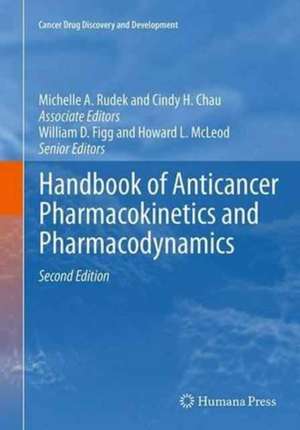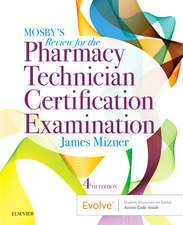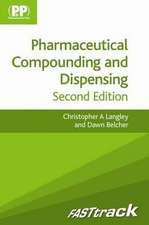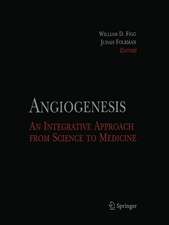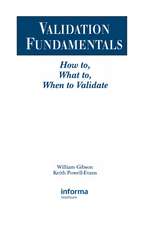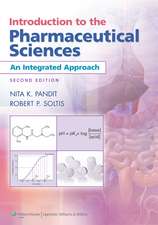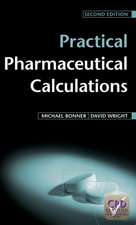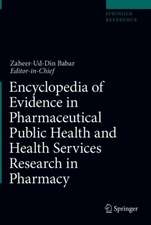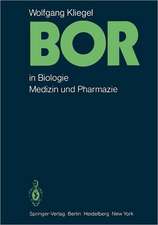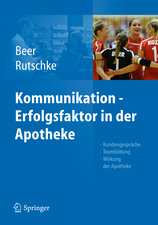Handbook of Anticancer Pharmacokinetics and Pharmacodynamics: Cancer Drug Discovery and Development
Editat de Michelle A. Rudek, Cindy H. Chau, William D. Figg, Howard L. McLeoden Limba Engleză Paperback – 23 aug 2016
Authoritative and up-to-date, Handbook of Anticancer Pharmacokinetics and Pharmacodynamics, 2nd Edition provides in one comprehensive and highly practical volume a detailed step-by-step guide to the successful design and approval of anticancer drugs.
- Road map to anticancer drug development from discovery to NDA submission
- Discussion of molecular targets and preclinical screening
- Development and validation of bioanalytical methods
- Chapters on clinical trial design and phase 0, I, II, III clinical trials
- Pharmacokinetics, pharmacodynamics, pharmacogenomics, and pharmacogenetics of anticancer agents
- Review of the drug development process from both laboratory and clinical perspectives
- New technological advances in imaging, high throughput platforms, and nanotechnology in anticancer drug development
| Toate formatele și edițiile | Preț | Express |
|---|---|---|
| Paperback (1) | 1829.53 lei 6-8 săpt. | |
| Springer – 23 aug 2016 | 1829.53 lei 6-8 săpt. | |
| Hardback (1) | 1860.09 lei 6-8 săpt. | |
| Springer – 11 ian 2014 | 1860.09 lei 6-8 săpt. |
Din seria Cancer Drug Discovery and Development
- 5%
 Preț: 1474.98 lei
Preț: 1474.98 lei - 5%
 Preț: 1108.35 lei
Preț: 1108.35 lei - 5%
 Preț: 1415.75 lei
Preț: 1415.75 lei - 5%
 Preț: 1370.19 lei
Preț: 1370.19 lei - 5%
 Preț: 1452.28 lei
Preț: 1452.28 lei - 5%
 Preț: 1316.74 lei
Preț: 1316.74 lei - 5%
 Preț: 1439.50 lei
Preț: 1439.50 lei - 5%
 Preț: 1113.63 lei
Preț: 1113.63 lei - 5%
 Preț: 1126.24 lei
Preț: 1126.24 lei - 24%
 Preț: 1037.59 lei
Preț: 1037.59 lei - 5%
 Preț: 1466.37 lei
Preț: 1466.37 lei - 5%
 Preț: 1350.78 lei
Preț: 1350.78 lei - 5%
 Preț: 1417.54 lei
Preț: 1417.54 lei - 5%
 Preț: 1113.46 lei
Preț: 1113.46 lei - 5%
 Preț: 1428.54 lei
Preț: 1428.54 lei - 5%
 Preț: 1429.80 lei
Preț: 1429.80 lei - 5%
 Preț: 782.10 lei
Preț: 782.10 lei - 5%
 Preț: 1438.58 lei
Preț: 1438.58 lei - 5%
 Preț: 1110.32 lei
Preț: 1110.32 lei - 5%
 Preț: 1434.39 lei
Preț: 1434.39 lei - 5%
 Preț: 1365.82 lei
Preț: 1365.82 lei - 5%
 Preț: 1461.08 lei
Preț: 1461.08 lei - 5%
 Preț: 1106.86 lei
Preț: 1106.86 lei - 5%
 Preț: 982.18 lei
Preț: 982.18 lei - 5%
 Preț: 727.80 lei
Preț: 727.80 lei - 5%
 Preț: 1331.76 lei
Preț: 1331.76 lei - 5%
 Preț: 1297.40 lei
Preț: 1297.40 lei - 5%
 Preț: 1124.59 lei
Preț: 1124.59 lei - 5%
 Preț: 1433.10 lei
Preț: 1433.10 lei - 5%
 Preț: 1110.90 lei
Preț: 1110.90 lei - 5%
 Preț: 1317.76 lei
Preț: 1317.76 lei - 5%
 Preț: 1464.91 lei
Preț: 1464.91 lei - 5%
 Preț: 1939.63 lei
Preț: 1939.63 lei - 5%
 Preț: 1418.48 lei
Preț: 1418.48 lei - 5%
 Preț: 1438.94 lei
Preț: 1438.94 lei - 5%
 Preț: 1100.30 lei
Preț: 1100.30 lei - 5%
 Preț: 1109.96 lei
Preț: 1109.96 lei - 5%
 Preț: 990.58 lei
Preț: 990.58 lei - 5%
 Preț: 1443.13 lei
Preț: 1443.13 lei - 5%
 Preț: 1428.91 lei
Preț: 1428.91 lei - 5%
 Preț: 787.58 lei
Preț: 787.58 lei - 5%
 Preț: 1311.72 lei
Preț: 1311.72 lei - 5%
 Preț: 1331.76 lei
Preț: 1331.76 lei - 5%
 Preț: 1113.11 lei
Preț: 1113.11 lei - 5%
 Preț: 1440.76 lei
Preț: 1440.76 lei
Preț: 1829.53 lei
Preț vechi: 1925.83 lei
-5% Nou
Puncte Express: 2744
Preț estimativ în valută:
350.08€ • 364.80$ • 289.87£
350.08€ • 364.80$ • 289.87£
Carte tipărită la comandă
Livrare economică 03-17 aprilie
Preluare comenzi: 021 569.72.76
Specificații
ISBN-13: 9781493938988
ISBN-10: 1493938983
Pagini: 848
Ilustrații: IX, 836 p. 145 illus., 46 illus. in color.
Dimensiuni: 178 x 254 x 45 mm
Greutate: 1.44 kg
Ediția:Softcover reprint of the original 2nd ed. 2014
Editura: Springer
Colecția Humana
Seria Cancer Drug Discovery and Development
Locul publicării:New York, NY, United States
ISBN-10: 1493938983
Pagini: 848
Ilustrații: IX, 836 p. 145 illus., 46 illus. in color.
Dimensiuni: 178 x 254 x 45 mm
Greutate: 1.44 kg
Ediția:Softcover reprint of the original 2nd ed. 2014
Editura: Springer
Colecția Humana
Seria Cancer Drug Discovery and Development
Locul publicării:New York, NY, United States
Cuprins
1. Molecular Targets.- 2. Preclinical Screening for New Anticancer Agents.- 3. Natural Product Screening.- 4. Defining the Starting Dose: Should it be mg/kg, mg/m2 or Fixed?.- 5. Phase 0 Trials in Oncology.- 6. Phase I Trials in Oncology - Design and Endpoints.- 7. Quantitative Analytical Methods: Development and Clinical Considerations.- 8. Validation and Control of Bioanalytical Methods.- 9. Anti-Cancer Clinical Pharmacology Overview.- 10. Pharmacokinetic Modeling.- 11. Pharmacometrics.- 12. Pharmacodynamic Modeling.- 13. Protein Binding.- 14. Metabolism (Non-CyP Enzymes).- 15. Pharmacogenomics and Cancer Therapy: Somatic and Germline Polymorphisms.- 16. Cytochrome P450.- 17. Polymorphisms in Genes of Drug Targets and Metabolism.- 18. DNA Repair: ERCC1, Nucleotide Excision Repair, and Platinum Resistance.- 19. Drug Interactions.- 20. ABC Transporters: Involvement in Multidrug Resistance and Drug Disposition.- 21. Solute carriers.- 22. High Throughput Platforms in Drug Metabolism and Transport Pharmacogenetics.- 23. Intrathecal Administration.- 24. Microdialysis.- 25. Regional Drug Delivery for Inoperable Pulmonary Malignancies.- 26. Blood-Brain-Barrier & CNS Malignancy.- 27. Radiation and Altering Clinical Pharmacology.- 28. Therapeutic Cancer Vaccines: An Emerging Approach to Cancer Treatment.- 29. Recombinant Immunotoxins.- 30. Monoclonal Antibodies.- 31. Clinical Pharmacology in Pediatrics.- 32. Clinical Pharmacology in the Elderly.- 33. Organ Dysfunction Trials: Background, Historical Barriers, Progress in Overcoming Barriers and Suggestions for Future Trials.- 34. Drug Formulations: How this Affects Anticancer Drug Pharmacokinetics and Pharmacodynamics.- 35. Nanotechnology in Cancer.- 36. Imaging in Drug Development.- 37. Exposure-Response Relationship of Anticancer Agents: Application in Drug Development and Drug Label.- 38. The Role of Phase III Trials in Modern Drug Development.- 39. Clinical Trial Designs for Approval of New AnticancerAgents.- 40. Clinical Pharmacogenetics.
Recenzii
"...an invaluable overview of the experimental and clinical processes that lead to anticancer drugs, creating a single indispensable reference that covers all the steps from the identification of cancer-specific targets to phase III clinical trials." - Tumori
Notă biografică
Dr. Michelle Rudek received her BS in Pharmacy from the University of Pittsburgh and her dual Pharm.D., Ph.D. from Virginia Commonwealth University in a joint clinical pharmacology/oncology program with the National Cancer Institute. Dr. Rudek joined Johns Hopkins University in 2001 and is currently an Associate Professor of Oncology and Director of the Analytical Pharmacology Core Laboratory. Her research program is focused on clinical pharmacology with a focus on early phase drug development and special populations including AIDS malignancy and organ dysfunction.
Dr. Cindy H. Chau received her BS in Molecular, Cell, and Developmental Biology from UCLA and her Pharm.D. and Ph.D. (in Molecular Pharmacology and Toxicology) dual degrees from the University of Southern California School of Pharmacy as a National Institutes of Health (NIH) predoctoral fellow. She was the recipient of the NIH National Research Service Award. Dr. Chau completed a postdoctoral fellowship at the NIH, joining the National Cancer Institute in 2004 and is currently a research scientist within the Medical Oncology Branch, Center for Cancer Research.
Dr. William Douglas Figg received his B.S. (Hon) from Georgetown College, his B.S. in Pharmacy from Samford University and his Pharm.D. from Auburn University. He completed his clinical pharmacy internship at the University of Alabama at Birmingham Hospital and his fellowship in drug development at the University of North Carolina-Chapel Hill. Dr. Figg also received an M.B.A. degree from a combined program at Columbia University and London Business School. He joined the Medical Oncology Branch, National Cancer Institute, National Institutes of Health in 1992. He has patented more than 80 new anticancer agents and four pharmacogenetic tests.
Dr. Howard McLeod is Fred Eshelman Distinguished Professor and Director, UNC Institute for Pharmacogenomics and Individualized Therapy,University of North Carolina, Chapel Hill. Dr. McLeod holds appointments in the UNC Schools of Pharmacy and Medicine, the Carolina Center for Genome Sciences, and the Lineberger Comprehensive Cancer Center. Dr McLeod is chair of the NHGRI eMERGE network external scientific panel and is a member of the FDA committee on Clinical Pharmacology. He is a member of the NIH NHGRI Advisory Council. Since 2002, Dr. McLeod has been vice chair for Pharmacogenomics for the NCI clinical trials cooperative group CALGB/ALLIANCE, overseeing the largest oncology pharmacogenomics portfolio in the world.
Dr. Cindy H. Chau received her BS in Molecular, Cell, and Developmental Biology from UCLA and her Pharm.D. and Ph.D. (in Molecular Pharmacology and Toxicology) dual degrees from the University of Southern California School of Pharmacy as a National Institutes of Health (NIH) predoctoral fellow. She was the recipient of the NIH National Research Service Award. Dr. Chau completed a postdoctoral fellowship at the NIH, joining the National Cancer Institute in 2004 and is currently a research scientist within the Medical Oncology Branch, Center for Cancer Research.
Dr. William Douglas Figg received his B.S. (Hon) from Georgetown College, his B.S. in Pharmacy from Samford University and his Pharm.D. from Auburn University. He completed his clinical pharmacy internship at the University of Alabama at Birmingham Hospital and his fellowship in drug development at the University of North Carolina-Chapel Hill. Dr. Figg also received an M.B.A. degree from a combined program at Columbia University and London Business School. He joined the Medical Oncology Branch, National Cancer Institute, National Institutes of Health in 1992. He has patented more than 80 new anticancer agents and four pharmacogenetic tests.
Dr. Howard McLeod is Fred Eshelman Distinguished Professor and Director, UNC Institute for Pharmacogenomics and Individualized Therapy,University of North Carolina, Chapel Hill. Dr. McLeod holds appointments in the UNC Schools of Pharmacy and Medicine, the Carolina Center for Genome Sciences, and the Lineberger Comprehensive Cancer Center. Dr McLeod is chair of the NHGRI eMERGE network external scientific panel and is a member of the FDA committee on Clinical Pharmacology. He is a member of the NIH NHGRI Advisory Council. Since 2002, Dr. McLeod has been vice chair for Pharmacogenomics for the NCI clinical trials cooperative group CALGB/ALLIANCE, overseeing the largest oncology pharmacogenomics portfolio in the world.
Textul de pe ultima copertă
There are many steps on the road from discovery of an anticancer drug to securing its final approval by the Food and Drug Administration. In this thoroughly updated and expanded second edition of the Handbook of Anticancer Pharmacokinetics and Pharmacodynamics, leading investigators synthesize an invaluable overview of the experimental and clinical processes of anticancer drug development, creating a single indispensable reference that covers all the steps from the identification of cancer-specific molecular targets to screening techniques and the development and validation of bioanalytical methods to clinical trial design and all phases of clinical trials. The authors have included new material on phase 0 trials in oncology, organ dysfunction trials, drug formulations and their impact on anticancer drug PK/PD including strategies to improve drug delivery, pharmacogenomics and cancer therapy, high throughput platforms in drug metabolism and transport pharmacogenetics, imaging in drug development and nanotechnology in cancer.
Authoritative and up-to-date, Handbook of Anticancer Pharmacokinetics and Pharmacodynamics, 2nd Edition provides in one comprehensive and highly practical volume a detailed step-by-step guide to the successful design and approval of anticancer drugs.
Authoritative and up-to-date, Handbook of Anticancer Pharmacokinetics and Pharmacodynamics, 2nd Edition provides in one comprehensive and highly practical volume a detailed step-by-step guide to the successful design and approval of anticancer drugs.
- Road map to anticancer drug development from discovery to NDA submission
- Discussion of molecular targets and preclinical screening
- Development and validation of bioanalytical methods
- Chapters on clinical trial design and phase 0, I, II, III clinical trials
- Pharmacokinetics, pharmacodynamics, pharmacogenomics, and pharmacogenetics of anticancer agents
- Review of the drug development process from both laboratory and clinical perspectives
- New technological advances in imaging, high throughput platforms, and nanotechnology in anticancer drug development
Caracteristici
Provides a detailed step-by-step guide to the successful design and approval of anticancer drugs Features updated research from 1st Edition and new, additional chapters Explores a wide variety of issues, including clinical trial design, preclinical screening, and the development and validation of bioanalytic methods Includes supplementary material: sn.pub/extras
